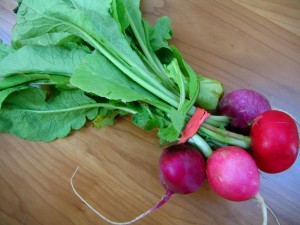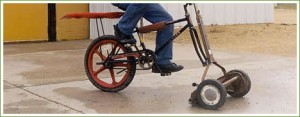Looking for a different kind of holiday gift? How about giving back to the Earth? Simple tips for respect and reciprocity with Earth. Bonus: if practiced, they will give back too. Reprinted from Intentblog.com.
We may be deeply aware, during this season of giving, that our lives depend on the gifts of the Earth. So how can we give back to the Earth? Here are 12 close-to-home ways to practice all year round.

Fresh radishes from a Boulder farm
1. Eat closer to home. The average American bite of food travels 1500 miles to reach the table. That’s an astronomical amount of fossil fuel used just in transporting the food, to say nothing of growing and packaging it. Join a local CSA (community-supported agriculture), or shop at farmers’ markets. For more info, see scientist and Earth lover David Suzuki’s page on food and our planet.
2. Eat organic. We all know it’s better for human health, and for the same reasons it is better for soil, water, and air health too. Eating organic keeps the soil, the foundation of life, healthy and safe. It keeps synthetic nitrogen out of waterways and prevents carbon emissions from entering the atmosphere. What’s good for your body is good for the Earth. Give back to Earth by giving back only substances that the Earth enjoys.
3. Thank your food. Look, really look, at the plants and animals on your table. Notice each one. Imagine the rice or oat or wheat grasses waving under the sun, the carrots developing underground, the strawberries ripening on the vine. If you eat meat, think about every animal. Picture the cow grazing (and if you eat cows, eat free-range, grass-fed, not corn-fed ones), the chicken scratching (make sure they led happy lives outside of cages), the fish swimming. Think about the life labor that the hen put forth in making an egg, the goat her milk.
Gratitude is a time-honored way of reciprocating. Thank each animal, each plant, every time, for the gifts of their lives and their bodies. Christians call it saying grace. Buddhists call it eating mindfully. All of us can thank the plants and animals. Our lives depend on them. Literally.

Bike-powered mower, from ecogeek.com
4. Power down your lawn care. A gasoline-powered lawn mower, gallon for gallon, emits more air pollutants than a car. Figured conservatively, even after new 2012 EPA lawn mower emissions standards, a mower emits as much pollution as four cars.
And don’t even think about leaf blowers. The noise disturbs humans and birds, they pollute in the same way lawn mowers do, and they disperse into the air millions of microorganisms that were intended to be left in the dirt to compost and renew, such as mold, dust, and animal feces.
If you have to use a mower, use a manual push mower. If your lawn is too big for a push mower, ask yourself, Do I really need this much grass?
5. Plant natives in your yard or in containers on your patio. Locally native plants, trees, and flowers evolved in community with each other and in tandem with the climate and soils in your area. They can handle the heat or the cold or the humidity or wind of your particular place. When you plant natives, you are expressing appreciation for your bioregion, seeking to live in harmony with it. Planting natives invites the local insects and pollinators back to your area, which in turn brings the birds and animals. Planting natives is a way of saying thank-you to your place.
6. For body care, stick to biodegradable. Pick your teeth the old-fashioned way, with wooden toothpicks instead of the tiny plastic picks and brushes that many dentists’ offices are passing out to their patients. For skin and hair care, avoid products with a chemical scent, which likely means they’re depositing synthetic chemicals on both you and your environment. Find products with the label certified biodegradable, which indicates they have been tested and met biodegradable standards.
7. Teach your children reciprocity. Even small children understand fairness. No one wants to get the short end of the stick. Teach your children to give back when they receive something. Practice it yourself. If each of us truly gave as much as we took, the world would change.

Urban redwoods in Joaquin Miller Park, Oakland, CA
8. Thank a tree. As you walk down your street, notice one tree or plant every day. Thank it for making oxygen. Your life depends on it. Go one step further in appreciating trees by stopping junk mail.
9. Work to reduce pesticide use in your neighborhood. We all know about pesticide use in agriculture, but pesticides are used at an equivalent rate on suburban lawns. What about the playing fields at your local school? (Fungicides and herbicides are pesticides too.) Children absorb more pesticides per pound of body weight than do adults, according to the National Academy of Sciences. For more info, see the “Lawn Care” page at Beyond Pesticides.
10. Refuse overpackaging. Say “no thanks” to foods or supplements prepackaged in tiny portions. Every piece of plastic ends up in a landfill—or on beaches or becoming part of the enormous swirling toilet bowls of plastic in our oceans, endangering the lives of sea creatures. Say no to those individually wrapped slices, those one-serving containers. Buy your food from farmers’ markets when you can (it’s local too!). Make it part of your lifestyle to reduce your use of plastic or go plastic free altogether.
11. Host a zero-waste party. It’s easier than you think. Paper plates and cups can be composted in municipal composting processes, and cornstarch-based compostable flatware and cups are now easy to find. Or visit your local thrift store and buy a few dozen older plates and forks and wash them afterward, then donate them back after the party’s over. Same with glasses and cloth napkins. I spent $25 at a thrift store for my last dinner party and then got credit afterward for the same amount in donation. That thrift store benefits a nonprofit group, so when they sell their merchandise twice they raise even more money.
12. Volunteer for a cleanup or restoration project in your area. You get the pleasure of meeting like-minded neighbors in addition to the joy of giving back to the Earth in a very direct and immediate way. The sense of camaraderie and a deep-seated satisfaction after a half day of work keeps restoration volunteers coming back. They look forward to having more fun!